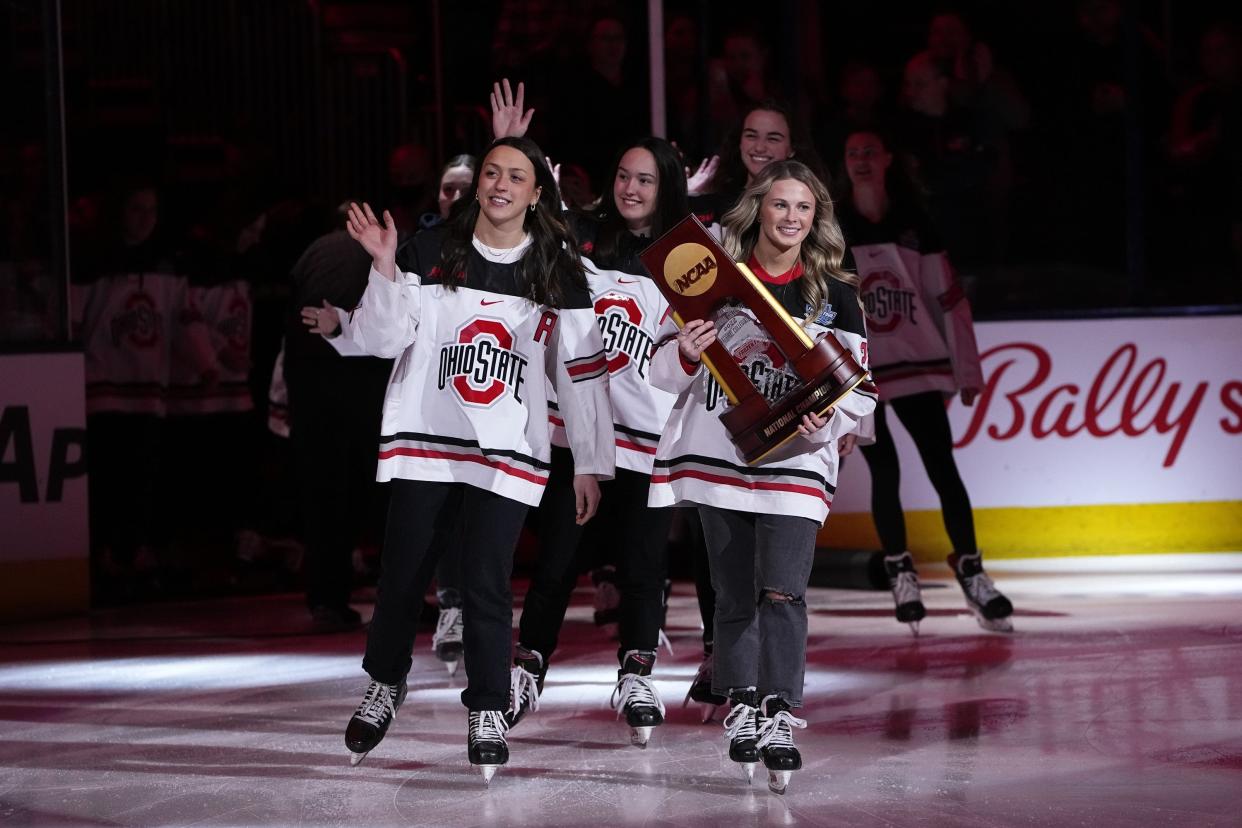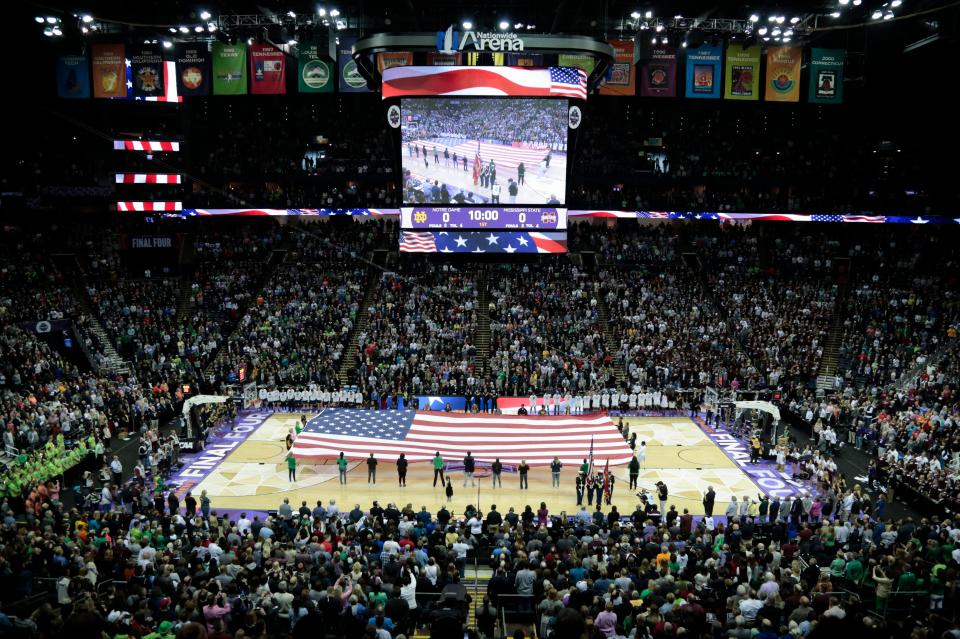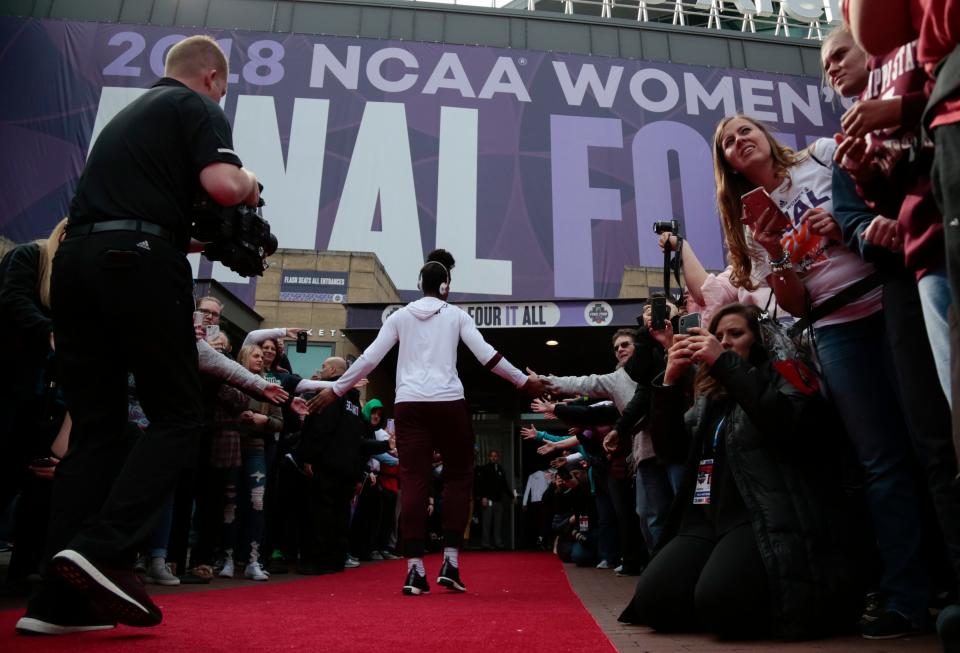Title IX paved way for Ohio State women athletes to shout 'National champs' | Rob Oller

Thirty-seven words written almost 50 years ago enabled Ohio State women’s hockey forward Paetyn Levis and her teammates to shout two words two weeks ago: "National champions!"
If not for Title IX, which became law on June 23, 1972, the Buckeyes would not have defeated Minnesota-Duluth for the NCAA title, because there would have been no championship game in the first place, because there would have been no women’s hockey.
Thankfully, there's no need to vex over the what-ifs, because the 37 words state:
“No person in the United States shall, on the basis of sex, be excluded from participation in, be denied the benefits of, or be subjected to discrimination under any education program or activity receiving Federal financial assistance.”
Title IX did not specifically target athletics, but girls and women’s sports are where it has received the most attention. Also the most love and most loathing. Going all-in on gender equity would seem a no-brainer, but Title IX remains a hot topic and sore spot a half-century later as debate rages over what constitutes equity and equality. Have we done enough to even the sides? Too much?
That discussion is for another day. For now, consider these 837 comparatively inconsequential words a celebration of the successes birthed by those powerful and hallowed 37.
“It’s been a dream since I was a little girl, but to ever think in my wildest dreams that it would ever come true? Probably not,” Levis said of winning the NCAA championship. “It’s literally living out a dream … of 17 years spent working toward a national championship.”
That is Title IX in the here and now, but to better appreciate its impact one needs to rewind history to before the Education Amendments of 1972.

Linda Logan loved sports, but they did not love her back, not in the same way they did for boys who were allowed to participate in organized school sports.
“I was a senior in high school (in 1972). I didn’t have sports. We didn’t have girls sports,” said Logan, who instead worked as sports editor for the Fairport Harding High School student paper and also worked as a basketball statistician.
Logan is not bitter about missing out. The executive director of the Greater Columbus Sports Commission instead focuses on the gains seen since her “no girls allowed” school days in Fairport Harbor, Ohio.
“There is a sense of pride in being part of the journey and evolution,” Logan said, noting how Columbus has become a destination for women’s college championships and has produced college champions, including most recently OSU women’s hockey, OSU synchronized swimming and Dublin Coffman graduate Abby Steiner, who last month set the NCAA indoor championship record for the 200 meters.
Logan was a driving force in bringing the 2018 NCAA women’s Final Four to Columbus, and she is again “throwing our hat in the ring” as the next Final Four bidding cycle is underway.

The 2018 Final Four was a huge success, but Logan stressed that providing equal opportunity to female athletes is an ongoing process.
“So many things still need to happen, and you’re seeing that now,” she said, referencing inequalities that turned up last season between the NCAA men’s and women’s tournaments. “Those things still happen, and we’re trying to right the ship. Our voices have gotten louder, or probably more people are listening.”
Ohio State junior guard Jacy Sheldon noticed changes happening at this year’s NCAA Tournament, where the Buckeyes made it to the Sweet 16 before bowing out against Texas.
“Last year there was a big difference between women’s and men’s facilities, such as weight rooms,” Sheldon texted. “The men were also given better gear. This year’s tournament has been very similar to the men’s. Last year a group of women’s players spoke out about the unequal treatment, and the NCAA has responded with closer to equal treatment this year!”
Sometimes it takes a cultural thunderclap to get our attention. Other times it is the sound of daughters delighting in their soccer performance.

Intellectually, it’s easy to see the importance of gender equality in sports, but often it requires an emotional investment to grasp the depth of the issue. Watching my daughters participate in organized sports drove home the reality that 50 years ago, they would have been hindered from competing in the same way as the boys.
Title IX compliance has increased female participation in high school sports from fewer than 300,000 nationwide in 1971-72 to more than 3.5 million in 2021, according to the National Federation of State High School Associations. The Ohio High School Athletic Association governs the same number of sports (14) for boys and girls. Ohio State has 17 women’s sports and 16 men’s. Access has improved. Opportunities are happening.
Levis and her teammates were honored last week at a Blue Jackets game. The crowd gave the champs a standing ovation.
“It was unbelievable,” Levis said.
It only felt that way. Fifty years ago, no one really would have believed it.
Progress.
This article originally appeared on The Columbus Dispatch: Ohio State women's hockey benefited from Title IX legislation

